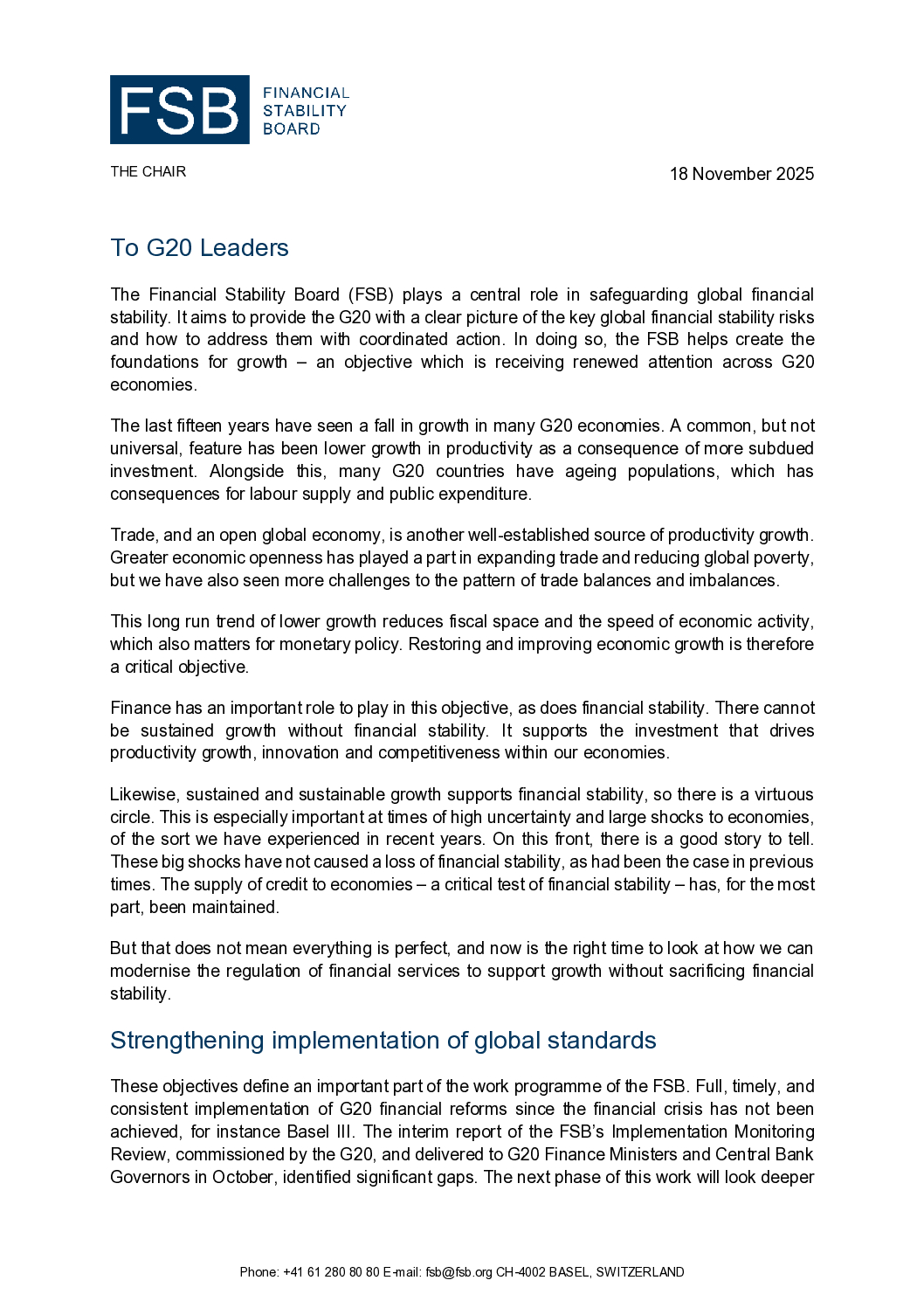Press enquiries:
+41 61 280 8477
[email protected]
Ref: 21/2025
- Acknowledging the challenging economic outlook, in his letter to G20 Leaders, FSB Chair, Andrew Bailey, calls for global efforts to modernise and strengthen financial regulation without compromising stability.
- Letter highlights the growing role of nonbank financial intermediaries, including private credit markets and outlines steps the FSB will take to monitor this growing sector.
- Letter underlines the urgency of improving cross-border payments and developing robust frameworks for stablecoins to ensure safe innovation and financial stability.
The Financial Stability Board (FSB) today published a letter from its Chair, Andrew Bailey, to G20 Leaders ahead of their Summit in Johannesburg on 22-23 November. In the letter, Andrew Bailey highlights the challenging economic outlook and the role financial authorities can play in supporting growth. The FSB’s interim report of its Implementation Monitoring Review identified significant gaps in the implementation of financial reforms. While the next phase of the FSB’s work will look deeper into where implementation was not achieved, Andrew Bailey stresses the importance of striking a balance between modernising financial regulation and ensuring its effectiveness in safeguarding the global financial system.
The letter highlights the increasing role of nonbank financial intermediaries in global financial markets, particularly in government bond markets and private credit markets, which have grown to an estimated US$2 trillion globally. The FSB remains committed to assessing the implications of these changes for the resilience of the financial system and ensuring that the evolution of nonbank finance does not compromise financial stability.
Andrew Bailey emphasises the need to accelerate progress on cross-border payments, warning that, despite some improvements, the current pace of change is insufficient to meet the ambitious goals set by the G20. The letter calls for accelerated momentum and continued attention to national policy barriers to achieve the objectives of the G20 Roadmap for Enhancing Cross-Border Payments.
New forms of payments and settlement are also emerging in what is a highly dynamic landscape. Digital assets, particularly stablecoins, are increasingly being used in payments, with implications for the financial system. Andrew Bailey calls on authorities to carefully consider how frameworks are designed to ensure they are effective, consistent, and supportive of safe innovation and notes that it will be equally important to consider how stablecoins can operate effectively and safely across borders. The FSB’s work programme for the year ahead will include a focus on stablecoins and other forms of payment.
The letter concludes by reaffirming the FSB’s commitment to supporting G20 member countries in addressing these challenges, maintaining financial stability, and ensuring that finance contributes to sustainable and inclusive economic growth.
Notes to editors
The FSB coordinates at the international level the work of national financial authorities and international standard-setting bodies and develops and promotes the implementation of effective regulatory, supervisory, and other financial sector policies in the interest of financial stability. It brings together national authorities responsible for financial stability in 24 countries and jurisdictions, international financial institutions, sector-specific international groupings of regulators and supervisors, and committees of central bank experts. The FSB also conducts outreach with approximately 70 other jurisdictions through its six Regional Consultative Groups.
The FSB is chaired by Andrew Bailey, Governor of the Bank of England. The FSB Secretariat is located in Basel, Switzerland and hosted by the Bank for International Settlements.
